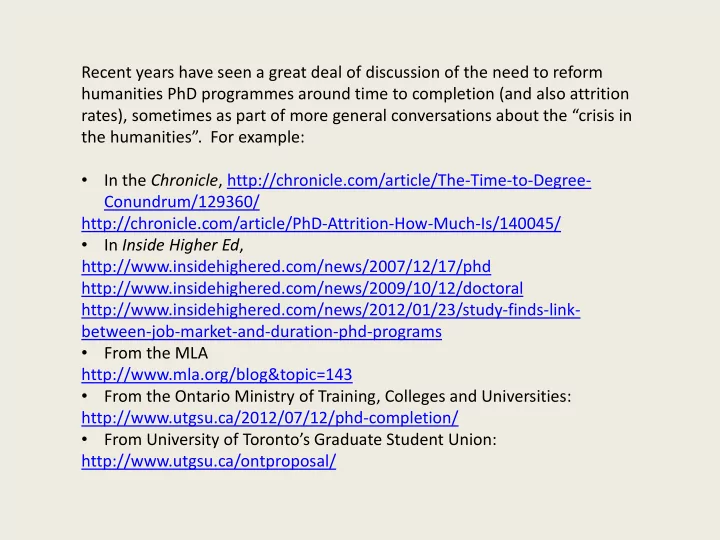

Recent years have seen a great deal of discussion of the need to reform humanities PhD programmes around time to completion (and also attrition rates), sometimes as part of more general conversations about the “crisis in the humanities”. For example: In the Chronicle , http://chronicle.com/article/The-Time-to-Degree- • Conundrum/129360/ http://chronicle.com/article/PhD-Attrition-How-Much-Is/140045/ In Inside Higher Ed , • http://www.insidehighered.com/news/2007/12/17/phd http://www.insidehighered.com/news/2009/10/12/doctoral http://www.insidehighered.com/news/2012/01/23/study-finds-link- between-job-market-and-duration-phd-programs From the MLA • http://www.mla.org/blog&topic=143 From the Ontario Ministry of Training, Colleges and Universities: • http://www.utgsu.ca/2012/07/12/phd-completion/ From University of Toronto’s Graduate Student Union: • http://www.utgsu.ca/ontproposal/
Defining the Problem Leo Charbonneau, “PhD Completion Rates and Times to Completion in Canada,” UA/AU , 12 February 2013, http://www.universityaffairs. ca/margin-notes/phd- completion-rates-and-times- to-completion-in-canada/. (Dates show when students entered the programme)
University of Toronto, Governing Council, Performance Indicators, 2012.
In light of the rate of educational debt carried by humanities doctoral recipients, twice that of their peers in sciences or engineering; in light of the lengthy time to degree in the humanities, reaching more than nine years [on average]; and in light of the dearth of opportunities on the job market [e.g. the 32% drop in MLA job listings since 2007-8], the system needs to be changed significantly. I want to begin to sketch out an agenda for reform. . . . . I appeal to those of you involved in the structure of doctoral programs to consider how to keep them open by making them more affordable and therefore more accessible. Can we redesign graduate student learning in the face of our changed circumstances? Russell Berman, MLA Presidential Address, extract from Inside Higher Ed , http://www.insidehighered.com/views/2012/01/09/essay-urges-reforms- doctoral-education-humanities#ixzz2fpQiAHl9
University of Toronto Graduate Student Union, Submission to MTCU, September 30, 2012.
Possible solutions New, shorter, 4 or 5 year humanities PhD programmes have recently been • introduced in individual departments at Havard, the University of Minnesota, and the University of Boulder, Colorado. Stanford has initiated a well-publicized faculty wide experiment in 5 year • PhD programmes: We submit that the humanities PhD can be returned to a position of central importance, at Stanford and in higher education elsewhere, by [among other changes]. . . rationalizing the investment (on the part of students and the university), by reducing time to degree. https://www.stanford.edu/dept/DLCL/cgi-bin/web/events/humanities- education-focal-group-discussion-future-humanities-phd-stanford
Stanford University is encouraging its humanities departments to redesign humanities doctoral programs so that students could finish in five years (down from the current average of seven at the university and much longer elsewhere), and so that the programs prepare students for careers in and out of academe. While the university is not forcing departments to change, it last week gave all humanities departments a request for proposals that offered a trade: departments that give concrete plans to cut time to degree and change the curriculum will be eligible for extra support -- in particular for year- round support for doctoral students (who currently aren't assured of summer support throughout their time as grad students). The plans would need to be measurable, and the support would disappear if plans aren't executed. Inside Higher Ed , http://www.insidehighered.com/news/2012/12/04/sta nford-moves-ahead-plans-radically-change- humanities-doctoral-education#ixzz2fpP85uTj.
GSU solutions surveyed University of Toronto Graduate Student Union, Submission to MTCU , September 30, 2012.
GSU solutions summarized: • more funding and reduced tuition (very popular) • more “monitoring,” unclear, but perhaps meaning more supervision: e.g. more dissertation writing assistance to students, more training for supervisors (seems popular) • more “monitoring,” unclear but perhaps meaning collection and publication of data on completion (seems popular) • more opportunities for conferences and networking (divided opinion) • promotion of placement for two years after completion (divided opinion) • make theses optional in some programmes (divided opinion) • change language requirements (divided opinion) • end programmes at year 4 or 5 (divided opinion)
Other Ideas Support from Stanford's Center for Teaching and Learning has led to an ad • hoc project on "Assessing Graduate Education," a twice-a-quarter discussion group to which all faculty and graduate students have been invited. Inside Higher Ed, http://www.insidehighered.com/views/2012/01/09/essay- urges-reforms-doctoral-education-humanities#ixzz2fpPMY6H4 David Damrosch, a professor of comparative literature at Harvard University, on • new systems there: “In anthropological terms, academia is more of a shame culture than a guilt culture: you may feel some private guilt at letting a chapter go unread for two or three months, but a much stronger force would be the public shame you'd feel at coming unprepared to a meeting with two of your colleagues,” he said. “It’s also ultimately a labor-saving device for the faculty as well as the student, as the dissertation can proceed sooner to completion and with less wasted effort for all concerned….” With frequent meetings, the students doesn’t lose time on “unproductive lines of inquiry” or “tangential suggestions tossed out by a single adviser.” Inside Higher Ed , http://www.insidehighered.com/news/2012/05/16/rethinking- humanities-phd#ixzz2fpSUmQTS
Other Ideas Emerging from Workshop Discussion: Remove stigma from non-completion so that students feel more able to choose • this option, earlier Reintroduce the MPhil diploma for students who never complete the • dissertation Remove the stigma from non-academic career paths for PhDs to make • completion more attractive Establish contact with possible supervisors from when students enter the • programme, in order to turn e.g. course work towards likely research interests Provide more formally-structured supervision, e.g. “contractual” arrangements • between students and advisors; termly committee meetings Consider the advantages and structure of 3-4 year programmes in UK, • Australasia, Italy, France and elsewhere – the “long assignment” style of PhD Provide accurate and open data on completion and placement rates to • students entering programmes Protect and provide longer programmes with language requirements (Classics, • modern languages, medieval studies, and others) while demanding shorter completion times from programmes without these Limit PhD admissions while increasing and extending funding • Establish more opportunities for safe exchange of feedback about the PhD • process between supervisors and PhD students
Recommend
More recommend